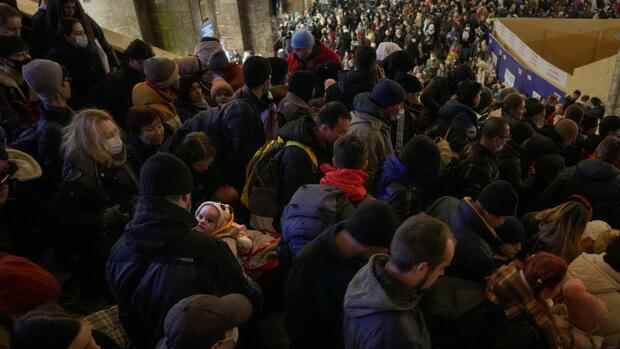Berlin Russian President Vladimir Putin’s war of aggression is driving hundreds of thousands of Ukrainians to flee. According to the UN refugee agency UNHCR, 660,000 people have already left the country.
Ukrainians who hold a biometric passport can also enter the EU without a visa and stay there for up to 90 days. Onward travel, for example from Poland to Germany or to another country in the so-called Schengen area, in which freedom of travel applies, is also permitted.
As reported by the Federal Office for Migration and Refugees (BAMF), Ukrainians can exceptionally also apply for a visa for Germany at the diplomatic missions in neighboring countries. If the stay is to be extended beyond 90 days, the local foreigners authority at the place of stay is responsible.
Top jobs of the day
Find the best jobs now and
be notified by email.
In a circular, the Federal Ministry of the Interior has already made it clear that, from its point of view, an uncomplicated extension by a further 90 days is possible according to the Residence Act. In the state of Berlin, Ukrainians who are new to the capital or whose short stay is expiring are allowed to stay until the end of May.
Ukrainians who have fled to Germany also have the option of applying for asylum or refugee protection in Germany.
(Photo: dpa)
Ukrainians who meet the requirements to work in Germany as skilled workers or as highly qualified persons according to the so-called “EU Blue Card” or to take up studies or training can obtain a residence permit for employment purposes from the foreigners authority responsible for their place of residence without a visa.
Can Ukrainians also apply for asylum?
Ukrainians who have fled to Germany also have the option of applying for asylum or refugee protection in Germany. However, it should be noted that visas issued for up to six months or the right to a short stay without a visa are no longer valid.
In addition, applicants must first live in a state reception facility, so they cannot simply stay with relatives or friends. There is a right to benefits under the Asylum Seekers Benefits Act and to accommodation. However, assets above 200 euros per person will be offset against the costs.
>> Read the impressions of our correspondents here: Dramatic scenes at the border: tens of thousands of Ukrainians flee from Putin’s troops to Poland
Claudius Voigt from the non-profit organization for the support of asylum seekers (GGUA) writes on the website of the unemployed and social welfare association Tacheles: “At the moment, an application for asylum should primarily make sense for people who are destitute, have no family ties and no accommodation options and also have no concrete prospect of taking up employment (as a skilled worker) or fulfilling another residence permit (training, studies, etc.).”
Are Ukrainians who have fled to Germany allowed to work?
Ukrainians who have entered the country without a visa are not allowed to work during the permitted short stay of up to 90 days. This also applies to an extension by the immigration authorities by a further 90 days. Exceptions only apply to a few activities such as internships or voluntary services. However, Ukrainians who have a valid work visa or an EU Blue Card for highly qualified workers can also work.
Are you entitled to social benefits?
Ukrainians who entered the country under the rules for short stays without a visa are not entitled to regular social benefits for three months – unless they apply for asylum or refugee protection, because then the Asylum Seekers Benefits Act applies.
There are several camp beds with sleeping bags in a gym on the grounds of the central initial reception facility for asylum seekers (ZABH) of the state of Brandenburg.
(Photo: dpa)
However, the poor can apply to the social welfare office for bridging and hardship benefits that cover the most necessary costs for food, clothing, accommodation or emergency medical care. After three months of residence, those in need are entitled to benefits to secure their livelihood (social assistance).
What relief is the European Union planning?
It is likely that the EU will soon implement for the first time the directive issued after the wars in the former Yugoslavia in the event of a “mass influx” of displaced persons. EU Interior Commissioner Ylva Johansson announced on Sunday that she would make a proposal at the meeting of EU interior ministers on Thursday.
Displaced persons who come to the EU because of the Russian war against Ukraine could then be granted immediate temporary protection with certain minimum standards without a lengthy asylum procedure.
Refugees then received a temporary right of residence for one year, with the option of extending it twice by six months. In addition, according to the directive, refugees should be allowed to work in the host countries and the destitute should be entitled to social benefits and benefits to secure their livelihood.
More: Municipalities expect “significantly more” than 100,000 Ukraine refugees in Germany
